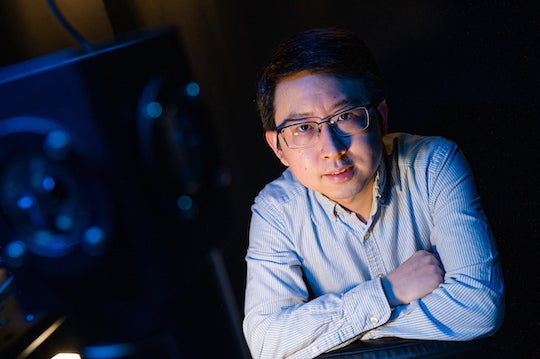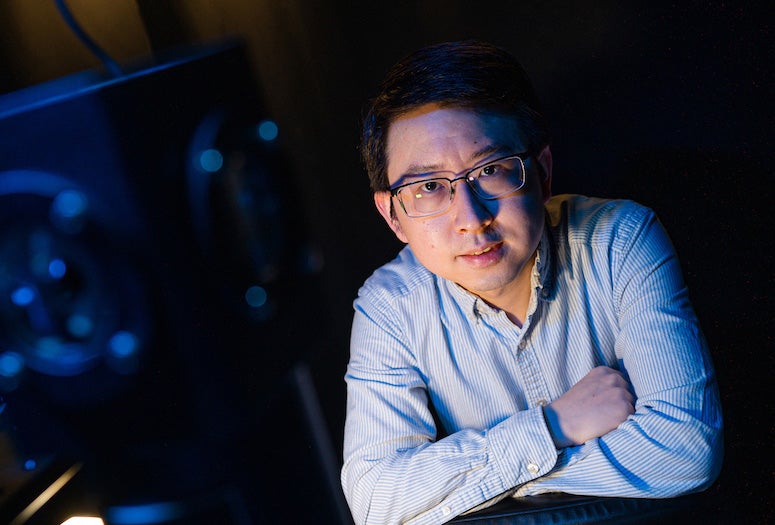Songtao Chen, an assistant professor of electrical and computer engineering at Rice University, has won a prestigious National Science Foundation CAREER Award to advance the development of quantum networks by leveraging imperfections ⎯ known as point defects ⎯ in silicon material.

The grants are awarded each year to a selective cohort of about 500 early career faculty across all disciplines engaged in pathbreaking research and committed to growing their field through outreach and education.
Chen will use the five-year, $750,000 grant to study how the quantum-level interaction between light and matter can help remove barriers limiting the large-scale implementation of quantum communication and computing, which could help tackle complex problems in medicine, cybersecurity, artificial intelligence, engineering, etc.
Chen’s research investigates how the interaction between photons and T centers, a recently identified type of point defect in silicon, can be used for quantum information applications.
“Atoms in solid-state silicon are organized in a perfect lattice,” Chen said. “The T center is a point defect in the regularity of this lattice. This defect has a spin component that we can use to build qubits and an optical component that can be exploited to interface with the spin. Research on the coherent control, measurement and entanglement of T center qubits could help turn them into building blocks of quantum network nodes.”
One of the most challenging aspects of quantum communication that Chen hopes to address is signal-loss during transmission.
“Whenever the photons that make up an optical signal propagate in an optical fiber, some of them will get lost as they travel over a certain distance, meaning the signal grows weaker the longer it propagates. Signal-loss grows exponentially with distance,” Chen said.
T centers generate photons that are significantly less likely to get lost during signal transmission, making them particularly well-suited to fiber-optic telecommunication.
“Silicon is a mature platform that has been the foundation for the success of integrated circuits and silicon photonics in the past decades,” Chen said. “Photonic device integration on the silicon platform could help enhance optical control and measurement of T centers.
“One of my long-term research goals is to develop T center-based silicon quantum photonic chips and build a fully functional quantum information processing system with a small footprint.”
In addition to research, Chen plans to develop and implement educational and outreach programs to engage students at different stages of instruction in quantum research.
“Because of the rapid development of quantum research, we are, to some extent, in a shortage of talented and diverse students and researchers,” Chen said. “We plan to address that at the graduate and undergraduate levels. We also have plans to include high school-level education outreach.”
-30-
- CAREER Award abstract:
-
https://www.nsf.gov/awardsearch/showAward?AWD_ID=2238298&HistoricalAwards=false
- Image downloads:
-
https://news-network.rice.edu/news/files/2023/06/230608_ARPA_Fitlow_11.jpg
CAPTION: Songtao Chen is an assistant professor of electrical and computer engineering at Rice University. (Photo by Jeff Fitlow/Rice University)
- Related stories:
-
Rice Quantum Initiative hires first two faculty:
https://quantum.rice.edu/news/rice-quantum-initiative-hires-first-two-faculty
Three new faculty join ECE department:
https://eceweb.rice.edu/news/three-new-faculty-join-ece-department - Links:
-
Chen lab: https://chenlab.rice.edu/
Quantum Initiative: https://quantum.rice.edu/
Department of Electrical and Computer Engineering: https://eceweb.rice.edu/
George R. Brown School of Engineering: https://engineering.rice.edu
- About Rice:
-
Located on a 300-acre forested campus in Houston, Rice University is consistently ranked among the nation’s top 20 universities by U.S. News & World Report. Rice has highly respected schools of Architecture, Business, Continuing Studies, Engineering, Humanities, Music, Natural Sciences and Social Sciences and is home to the Baker Institute for Public Policy. With 4,552 undergraduates and 3,998 graduate students, Rice’s undergraduate student-to-faculty ratio is just under 6-to-1. Its residential college system builds close-knit communities and lifelong friendships, just one reason why Rice is ranked No. 1 for lots of race/class interaction and No. 4 for quality of life by the Princeton Review. Rice is also rated as a best value among private universities by Kiplinger’s Personal Finance.

